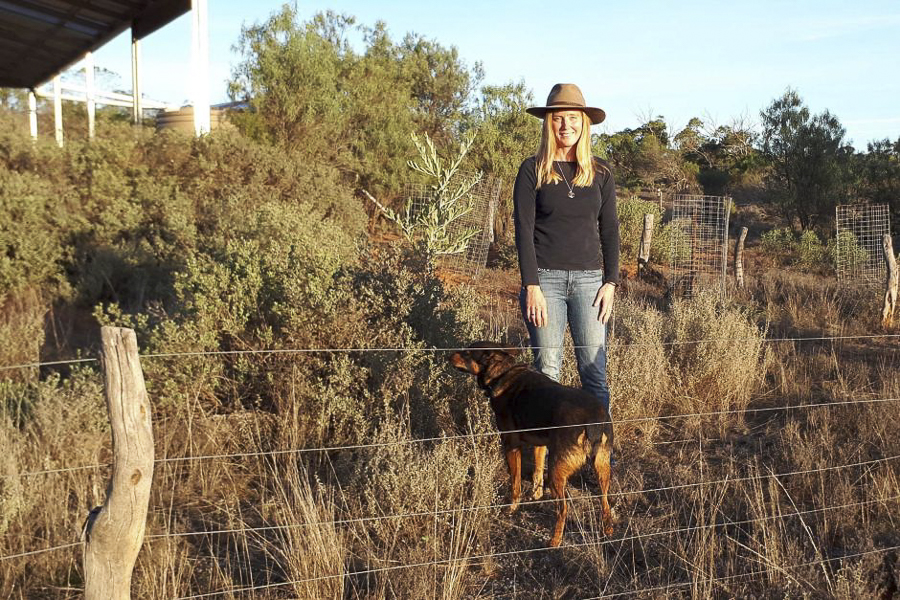
Professor Katherine Moseby
Centre for Ecosystem Science, University of New South Wales
See Dr Moseby’s full research profile here.
Research outputs linked to policy change and decision-making
- Fauna reintroductions. Dr Moseby’s research on fauna reintroductions focuses on improving the way reintroductions are undertaken in Australia and abroad. She has provided a theoretical framework for testing release strategies in global reintroductions and empirically demonstrated that fenced reserves are currently the only way to effectively conserve mainland Australia’s threatened arid-zone fauna due to the threat posed by introduced predators. Her research on threatened species protection fencing has been adopted widely both in Australia and overseas. She works with stakeholders from a wide a wide range of government, university and non-government organisations (NGOs) to create reintroduction partnerships such as Arid Recovery, Wild Deserts and Mallee Refuge.
- Predator ecology and prey naivety. Dr Moseby’s research on predation impacts and predator ecology is designed to change the way we view predators and how we manage them. She demonstrated that there is significant variation in the threat that individual predators pose to reintroductions leading to partnerships with NGOs and industry organisations to develop 2 new feral-animal control technologies including the Felixer grooming trap and population-protecting implants. Dr Moseby has tested the efficacy of aerial baiting for feral cats, and the benefits of in-situ predator-awareness training in wildlife. Her role on the management committee for Wild Deserts led to the inclusion of a 104 km2 wild training zone to ensure species are familiar with predators before being released. Dr Moseby’s work on the interactions of dingoes with cats and foxes suggests that dingoes may play an important role in suppressing these species for the benefit of threatened species.
- Arid zone restoration ecology. Dr Moseby has quantified the impacts of feral cats and foxes on extant arid-zone rodents and reptiles through exclusion of introduced predators, and her work has provided an insight into pre-European fauna assemblages and the important role of mammals as ecosystem engineers. She demonstrated that biocontrol of rabbits has led to the greatest recovery of threatened species ever documented in Australia, changing the way in which we view landscape-scale restoration. Her self-published identification and monitoring manual for tracks, burrows and scats of arid-zone fauna (Tales in the Sand) has sold over 5,000 copies Australia-wide. This method has been adopted by Indigenous groups and national parks for monitoring threatened desert species and led to a National Environmental Science Program grant to expand the project nationally. She currently sits on a number of committees and recovery teams to assist in addressing threatened species declines in arid areas.
Current academic employment and positions
- Senior lecturer, Centre for Ecosystem Science, School of Biological, Earth and Environmental Sciences, University of New South Wales
- Principal scientist, Arid Recovery Limited.
Highest qualification
- 2012: PhD, University of Adelaide.
Major prizes, medals and honours
- 2021–2024: Australian Research Council Future Fellowship
- 2016–2020: Australian Research Council DECRA Fellowship
- Deans Commendation for thesis excellence (PhD)
- Smyth Memorial Prize (Honours)
- John Bagot Scholarship (undergraduate).
Roles on government or regional organisation committees
- Great Victoria Desert Biodiversity Trust scientific advisory committee
- Wild Deserts executive management committee
- Wild dog management board, South Australia
- Bilby Recovery Team scientific advisory panel
- Shark Bay mammal recovery team
- Chuditch recovery team
- Arid Recovery scientific advisory panel
- Middleback Alliance management committee.
Links with non-government groups or networks of relevance
- member, International Union for Conservation of Nature (IUCN) reintroduction specialist group
- International Reintroduction Conference organising committee
- Arid Recovery principal scientist
- director, Ecological Horizons environmental consultancy
- director, Middleback Alliance conservation charity
- patron, Tetepare Descendants Association, Solomon Islands.
My Projects
 Current project
Current project Completed project
Completed project
NESP RLH, 2021-2027NESP, 2015-2021NERP, 2012-2015TRaCK, 2005-present
